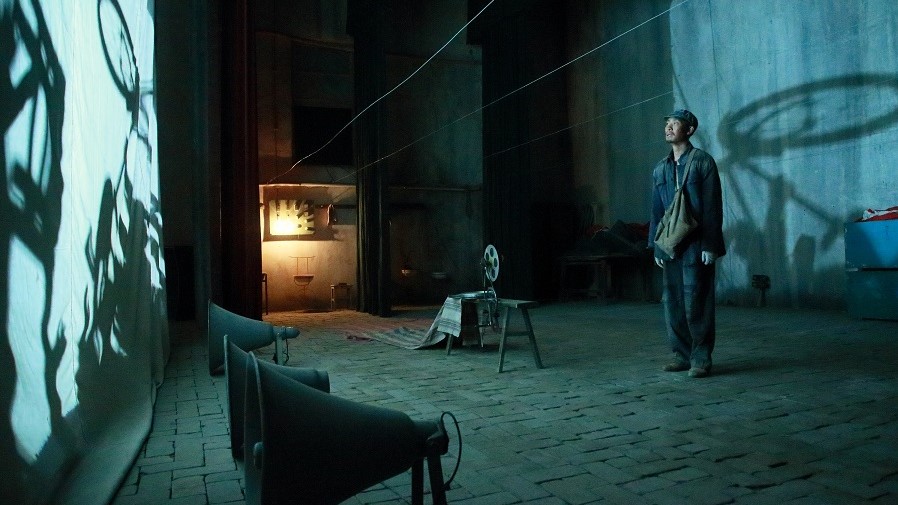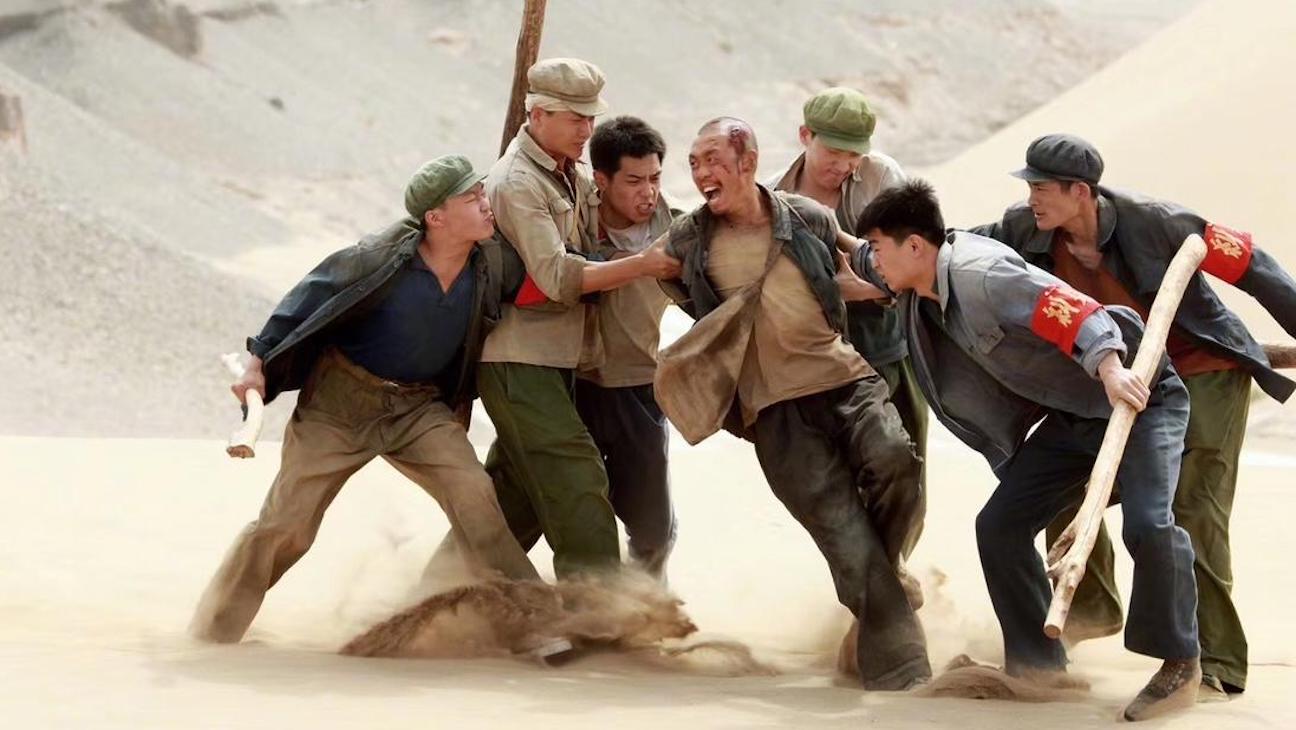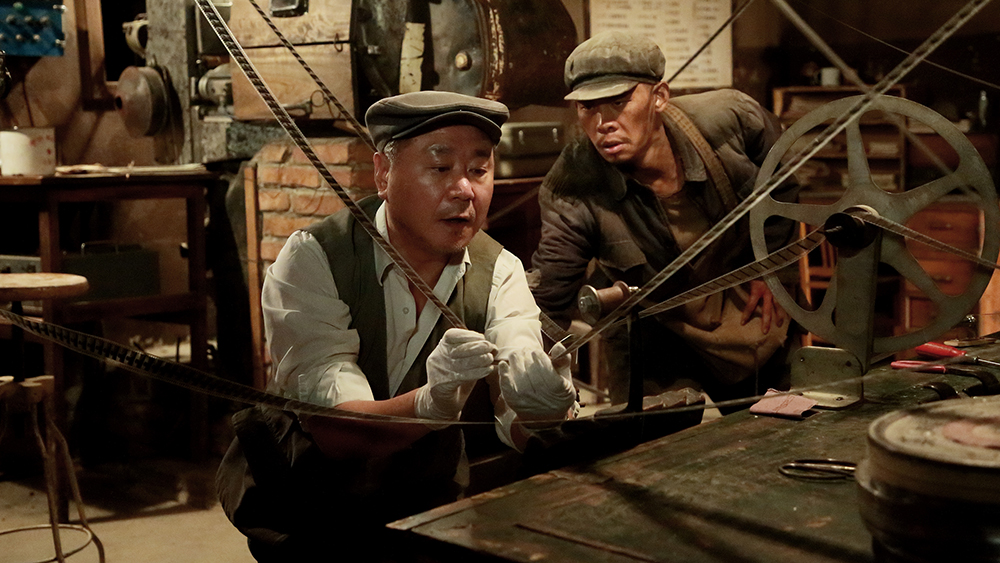One Second is a different sort of film for director Zhang Yimou. The Chinese master has earned his stripes through a variety of historical epics and wuxia films, such as Raise the Red Lantern, Hero, The House of Flying Daggers and The Great Wall. It’s a far more recent Chinese history that interests him in this story of the health and whereabouts of a newsreel in rural China of Chairman Mao’s reign, during the Cultural Revolution of the 1960s and 1970s. Whatever time period Zhang finds himself in, his love for the power of cinema is evident – perhaps never more literally than here.
This is a love letter to the moving image for Zhang in the same way Cinema Paradiso is a love letter to the moving image for Giuseppe Tornatore. The village depicted in this film, in a habitable area of the Gobi Desert, has the same feel as the small Italian town in Tornatore’s film, its cultural life revolving around the arrival and screening of reels of celluloid.
There’s a censorship in place in both films as well. While all the kissing scenes need to be edited out of the films screened in Cinema Paradiso – a detail that factors heavily into the climax – the control of what plays is a lot tighter here. In communist China, only one of two propaganda films makes its way to the masses – either Heroic Sons and Daughters or Fighting North and South. They know the films by heart but that doesn’t decrease their appetite for yet another viewing.
Neither of the central two characters is interested in either film. Zhang Yi plays a nameless fugitive from a labour camp, who is tracking a newsreel that will play before the feature, because his daughter appears in it. Liu Haocun plays Orphan Liu, who is trying to get her hands on the newsreel in order to make a lamp shade for her studious younger brother. We don’t initially know either of their agendas toward the newsreel, just that a cat-and-mouse game develops as she tries to steal it from the back of the motorcycle where it’s being transported, and he tries to return it so the local projectionist, nicknamed Mr. Movie (Fan Wei), can show it before the feature – all while evading detection as an escaped fugitive.
There wouldn’t seem to be a lot, story-wise, to One Second, though through the spare plot, a portrait of China under Mao comes into focus. To Zhang’s credit, he doesn’t lay any commentary on very thick – though that’s possibly the result of a pragmatic need to abide by the strictures of today’s Chinese government. We don’t need a strident denunciation of communism because it creeps in from the edges and displays itself through the desperation of its handful of characters.
The primary focus, from the standpoint of themes and story, can be the preservation of the life of the celluloid, as much a commentary on our current shift to digital cinematography and projection as it is on the prevailing conditions in China 50 years ago. A series of mishaps befalls the feature the town is waiting to watch, involving the incompetence of the locals charged with handling the reels. Suffice it to say that at one point, the feature lies in the dusty streets, strewn about in a way Mr. Movie compares to a donkey’s intestines. The middle portion of One Second involves the painstaking process to clean and re-spool the film, which becomes a community effort. This is where Zhang communicates his passion for the core infrastructure of his art form, as it appeared during the era the 70-year-old would have himself first experienced it.
One Second treads water at certain points. You occasionally wish there were maybe a few additional characters, an additional subplot or two to further draw out the themes. That said, the time spent with Orphan Liu and the fugitive – initially adversaries, then ultimately bonded compatriots – really builds our appreciation of their circumstances and the stories that have led them to this point in their journeys. They are individually unremarkable, yet each embodies the world they were living in at the time.
In terms of what Zhang brings to the cinematic landscape, we’d probably benefit from this being a one-off for the director. The thing you miss most from One Second, if you’re coming in with preconceived notions about the director’s filmography, is his trademark bursts of colour, especially evident in Hero. That said, Zhang’s last feature, Shadow from 2018, was purposefully composed in shades of grey and steely silver. Zhang is not content being just one thing as a director, and to the extent that One Second allows him to further explores his own gifts, we should welcome any number of other similar efforts from him. Especially when they allow him to reflect on his own personal history vis-à-vis the art form that has defined him.
One Second is currently playing in cinemas.


